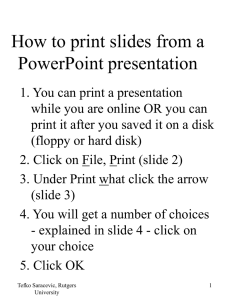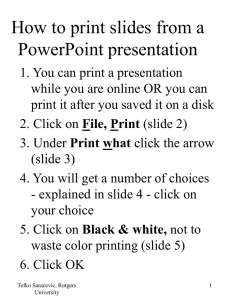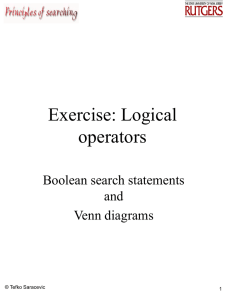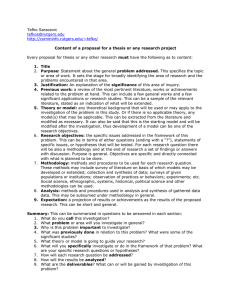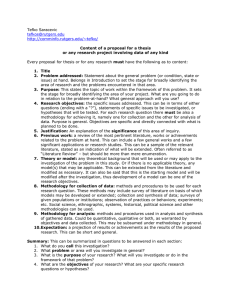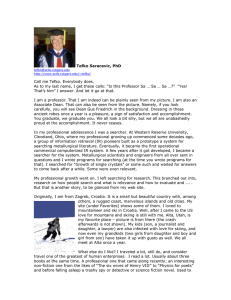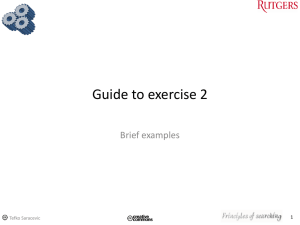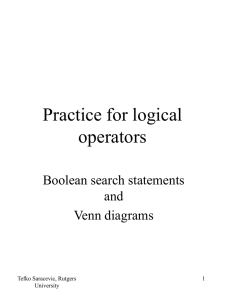Lecture00_Overview1.ppt
advertisement
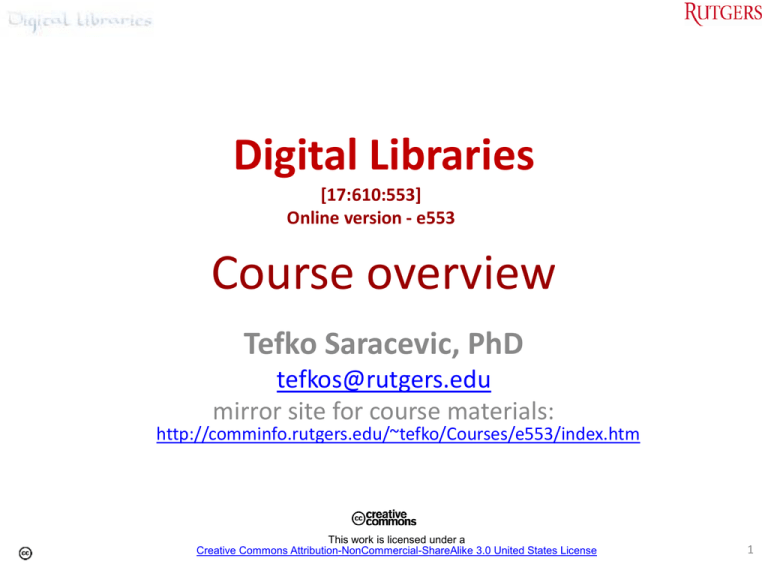
Digital Libraries [17:610:553] Online version - e553 Course overview Tefko Saracevic, PhD tefkos@rutgers.edu mirror site for course materials: http://comminfo.rutgers.edu/~tefko/Courses/e553/index.htm This work is licensed under a Creative Commons Attribution-NonCommercial-ShareAlike 3.0 United States License 1 ToC of this Overview • First a few mechanics • Then description of the course – more or less as found in the syllabus – for details consult the syllabus and bibliography, as main course documents – syllabus includes, among others, • general description of assignments • your choices of the term project • detailed criteria for grading When in doubt go to syllabus Tefko Saracevic 2 How will we communicate? • Through course site on eCollege – course email - whole class, groups, or one-on-one – discussion threads by unit or topic • simulates a live class discussion - you are required to participate in each week’s discussion – class lounge (on course site) – sections: • Introduce Yourself • Matters of class: ask questions – provide answers – chat • whole class, groups, or one-on-one • By phone – via PC to PC phone – through Skype – free, register – I will provide times when available • Individual contacts made on your own Tefko Saracevic 3 How will course work be done? • Course Home Page – announcements – Course Checklist; downloads • Each weekly unit has 1. Assignment – read, digest, & then address questions to be turned in as an essay (critical review) 2. Exercise – performed, reported 3. Threaded discussion (simulates class discussion) – discuss, reply, comment… ALL REQUIRED EVERY WEEK! • Dropbox – submitting & retrieving assignments & exercises Tefko Saracevic 4 coursework (cont.) • Journal • place where you can make notes & record thoughts – not required but highly recommended • option of sharing • Doc sharing • uploading & downloading documents by instructor & students • but other documents from RUL directly • Webliography • relevant sites submitted by instructor & students; could be annotated • Calendar & schedule • schedule of course events to be followed – assignments, exercises, project… • Gradebook • providing grades & comments Tefko Saracevic 5 Additional course sources • e553 course web site in addition to eCollege – mirror site: posted are static course materials • syllabus, bibliography, lectures, assignments, exercises, etc Tefko Saracevic 6 Student groups • Idea: work together, help each other • Groups of 4-5 students will be formed • you can form them on your own or I will assign group members – preferably you form them • cooperate as to exercises, assignments – you can work as a group • carry on own discussion • lead weekly discussion when scheduled • Term project can be done as a group project • as an incentive, I grade the project without regard to how many people worked on it Tefko Saracevic 7 Course objectives Integrated understanding of: • A. Concepts: What are digital libraries? Differing conceptions & approaches • B. Content: Changing nature of collection in a digital & networked environment • C. Organization: Representation, metadata • D. Services: Alternatives in access to digital libraries. User communities & use. Evaluation Tefko Saracevic 8 Objectives … • E. Research & development: Research and developmental projects and initiatives. Future trends. • F. Context: Institutional effects. Management. Social, economic, ethical, and legal concerns. • Note: technology is NOT covered in this course because there are other courses doing that: – – – – 17:610:550 Information Technology for Libraries and Information Agencies 17:610:558 Digital Library Technology 17:610:552 Understanding Library Systems & Software Applications 17:610:554 Information Visualization and Presentation Tefko Saracevic 9 Symbolically … assortment Concepts Content Organization Tefko Saracevic diversity metadata 10 10 Symbolically .. Service users Research about Context issues Tefko Saracevic 11 Mix • The course is a mix of – issues – practice – research • Why research? – Base for further institutional & professional development – need to incorporate & evaluate Tefko Saracevic 12 Organization • Course is organized around the six themes outlined • Each of the themes has two or three units – one unit per week – 15 weeks = 15 units • Follow course schedule Tefko Saracevic 13 Topics covered - units 0. Overview Theme A. Concepts 1. What is a digital library? 2. History 3. Keeping up Theme B. Collection 4. Diverse digital libraries 5. Collections in digital libraries Theme C. Organization 6. Representation. Metadata 7. Digitization Tefko Saracevic 14 Topics (cont.) Theme D: Services 8. Variety of services. Access 9. Evaluation Theme E: Research & development 10. Research projects 11. Preservation Theme F:Context 12. Economic issues 13. Legal issues. Copyright 14. Trends. Future? 15. Course evaluation Units 14 & 15 are also student presentation of term project & Tefko Saraceviccourse evaluation 15 What will go on? Grading? Each unit has: 1. Lecture 2. Assignment – required weekly - per schedule 3. Exercises – required weekly - per schedule 4. Discussion – required weekly participation 60% of grade Semester long: Term project (40% of grade) For grading criteria see syllabus Tefko Saracevic 16 Assignments: (1) Read, (2) Digest & (3) then Write • Readings: listed in assignment; can be substituted – your choice; there is an art of reading scholarly & professional articles • Digest: identify main points, methods, conclusions On the basis of that your deliverable is an: • Essay: answer questions in a critical review; follow style of articles in selected journal – – – – questions can be substituted, but had to be clearly stated MUST follow APA format (described in syllabus) MUST have prescribed filename content is much more important than length Tefko Saracevic 17 Exercises • Designed to provide practical experiences: – examination, evaluation & comparison of various features of digital libraries and related areas, or – practical assignments related to either data handling, creating a display, or providing access • Deliverables given • MUST have prescribed filename Tefko Saracevic 18 Discussion • Student driven dialog about given questions, readings, issues • Each student responsible to contribute to discussion every week & whenever possible engage with colleagues • Weekly participation required – graded four times in semester Assignments, exercises, and discussion are done on a weekly basis per schedule and all are required Tefko Saracevic When in doubt go to schedule 19 Term project – semester long • Choice of one of three: 1. critical evaluation & comparison of digital libraries, research, issues final product (deliverable): report 2. or: design proposal for a specific digital library or service, or aspect final product: design document 3. or: a digital library prototype for a small digital library or function • final product: online prototype & description • Requires a proposal, interim report, and final report/result • per schedule • each MUST have prescribed filename • For the term project you can work cooperatively in groups – result is a group reports, as indicated Note: if selecting evaluation see materials in unit 9, Evaluation Tefko Saracevic 20 Term project ... • Designed for students to – get into depth on a chosen topic – gain practical experiences – gain background knowledge and competencies • Can be done as group project • Suggest to “double dip:” use this semester to create a digital library project that may help your career, or further your existing interests Tefko Saracevic 21 What will the course NOT do? • Create professional digital or systems librarians out of you • Make you an expert on digital libraries & networks • Get you to become a D-Lib whiz – but it will start you on the way – “whizness” should also be picked up from other courses and from learning & practice on your own Tefko Saracevic 22 What will the course DO? • Provide you with a practical & theoretical foundation and framework on basis of which you can then: – start your development toward a professional with expertise in digital libraries – grow & evolve with the field – adjust to inevitable changes in the world of digital libraries – eventually, depending on your other courses & life-long learning, become an expert Tefko Saracevic 23 Challenging? • You bet! • Lots of work! – think it over right at the beginning whether ... • But also highly rewarding – you will learn a lot! Tefko Saracevic 24 Wordle representation of the syllabus Tefko Saracevic 25 Tefko Saracevic 26
